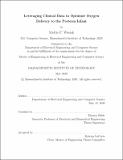Leveraging clinical data to optimize oxygen delivery to the preterm infant
Author(s)
Wasiak, Mattie F.
Download1193031374-MIT.pdf (4.702Mb)
Other Contributors
Massachusetts Institute of Technology. Department of Electrical Engineering and Computer Science.
Advisor
Thomas Heldt.
Terms of use
Metadata
Show full item recordAbstract
Determining an optimal target oxygen range has been a recurring debate in neonatal intensive care units (NICUs) as researchers and clinicians have taken note of the morbidity and mortality associated with high and low arterial oxygen saturations (SpO₂), respectively. In this thesis, we validated the real time data streams from the 48-bed Beth Israel Deaconness Medical Center NICU and leveraged these massive amounts of physiological data streams to analyze and identify clinical, demographic, physiological, and workflow factors that may affect the in-target oxygenation of premature infants. We studied a cohort of 865 preterm infants (gestational age < 37 weeks) that were in the NICU for more than 24 hours between January 1, 2018 and September 12, 2019; 412 of these patients were recorded on supplemental oxygen at some point during their stay. We had SpO₂ data coverage of 90.3% at the NICU level. We determined that patients spent 90.0% of their collective stay within their target SpO₂ range; 4.9% of their stay below their target SpO₂ range; and 5.1% of their stay above their target SpO₂ range. For patients on supplemental oxygen, we determined that these patients spent 24.0% of their time above their target SpO₂ range while on supplemental oxygen. We investigated various factors' relationships with SpO₂; these factors included gestational age, birth weight, gender, supplemental oxygen, postmenstrual age, time of day, and bed space assignment. Overall, we determined that younger patients with lower birth weights spend the least time within their target SpO₂ range. Male patients also spent a greater % time above their target SpO₂ range while on supplemental oxygen than female patients.
Description
Thesis: M. Eng., Massachusetts Institute of Technology, Department of Electrical Engineering and Computer Science, May, 2020 Cataloged from the official PDF of thesis. Includes bibliographical references (pages 147-149).
Date issued
2020Department
Massachusetts Institute of Technology. Department of Electrical Engineering and Computer SciencePublisher
Massachusetts Institute of Technology
Keywords
Electrical Engineering and Computer Science.